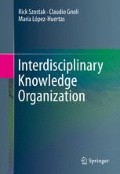Abstract
We have often in preceding chapters stressed the complementarity of domain analysis with the sort of comprehensive classification advocated in this book. A classification such as we have proposed will work for scholars from different domains only if the terminology of those domains has been accurately translated into the terminology employed within the comprehensive classification.
Access this chapter
Tax calculation will be finalised at checkout
Purchases are for personal use only
Notes
- 1.
We focus on those types of domain analysis with the greatest implications for classification. We do not, for example, discuss network analysis here because the purpose of network analysis is to identify the connections among researchers.
References
Association for Interdisciplinary Studies (AIS) (2013) About interdisciplinarity. http://www.oakland.edu/ais/
Bruschini C, Ardaillon D, Unbehaum S (1998) Tesauro para Estudos de Gënero e sobre Mulheres. Fundación Carlos Chagas, Sao Paulo
Dogan M, Pahre R (1990) Creative marginality: innovation at the intersection of social sciences. Westview, Boulder, CO
Glenisson P, Glänzel W, Persson O (2005) Combining full-text analysis and bibliometric indicators. A pilot study. Scientometrics 63(1):163–180
Hinze S (1996) Mapping of RandD structures in transdisciplinary areas: new biotechnology in Food Science. Scientometrics 37(2):313–335
Hjørland B (2002) Domain analysis in information science. Eleven approaches—traditional as well as innovative. J Doc 58(4):422–462
International Information Centre and Archives for the Women’s Movement (IIAV) (1998) European Women’s thesaurus. IIAV, Amsterdam
Instituto de la Mujer (España). Centro de Documentación (2002). Tesauro “Mujer”. Madrid, Instituto de la Mujer, 1999. 6ª ed. Rev. 2002. http://www.mtas.es/mujer/t2002.doc
Jacob S (2008) Cross-disciplinarization. A new talisman for evaluation? Am J Eval 29(2):175–194
Julien C-A, Tirilly P, Dinneen J, Guastavino C (2013) Reducing subject tree browsing complexity. J Am Soc Inform Sci Technol 64:2201–2223
Kobashi NY, Smit JW, Talamo MGM (2001) A função da terminologia na construção do objeto da Ciência da Informação. DataGramaZero–Revista de Ciência da Informação 2(2)
López-Huertas MJ (2006a) Análisis del dominio interdisciplinar para la representación y organización del conocimiento. Conferencia invitada en Memória, Informaçao e Organização do Conhecimento: Cruzando as fronteiras da identidade. UNIRIO-IBICT, Río de Janeiro, pp 209–236
López-Huertas MJ (2006b) Thematic map of interdisciplinary domains based on their terminological representation. The gender studies. In: Budin G, Swertz C, Mitgutsch K (eds) Knowledge Organization for a Global Learning Society. Proceedings of the ninth international ISKO conference, Vienna. Ergon, Würzburg, pp 331–338
López-Huertas MJ (2006c) Aproximación a un modelo para la construcción de mapas temáticos en dominios interdisciplinares. First international conference on multidisciplinary information sciences and technologies, InSciT2006, Cáceres. Instituto Abierto del Conocimiento, Badajoz. pp 548–552
López-Huertas MJ (2007) Comment on the León Manifesto. www.iskoi.org/ilc/leon.php
López-Huertas MJ (2008) Cultural impact on knowledge representation and organization in a subject domain. In: Arsenault C, Tennis J (eds) Culture and identity in Knowledge Organization, Proceedings of the 10th international ISKO conference, Montréal. Ergon, Würzburg
López-Huertas MJ (2009) La terminología como método para representar y organizar dominios multidimensionales. 1er Simposio sobre Organización del Conocimiento: Bibliotecología y Terminología. UNAM, México
López-Huertas MJ, Barité M (2002) Knowledge representation and organization of Gender Studies on the Internet: towards integration. In: López-Huertas MJ (ed) Challenges in knowledge representation and organization for the 21st century. Integration of knowledge across boundaries. Proceedings of 7th international ISKO conference, Granada. Ergon, Würzburg
López-Huertas MJ, Jiménez Contreras E (2004) Spanish research in Knowledge Organization (1992–2001). Knowl Org 31(3):136–150
López-Huertas MJ, Barité M, Torres I (2004) Terminological representation of specialized areas in conceptual structures: the case of Gender Studies. In: McIlwaine IC (ed) Proceedings of the 8th international ISKO conference. Ergon Verlag, Würzburg, pp 263–268
McAlpine S (2014) Concept mapping model, academic disciplines, and interdisciplinarity. Crossing Border Int J Interdiscipl Stud 2(1):7–12
Moya F, López-Huertas MJ (2000) An automatic model for updating the conceptual structure of a scientific discipline. In: Beghtol C, Howarth L, Williamson N (eds) Dynamism and stability in knowledge organization. Proceedings of the sixth international ISKO conference. Ergon Verlag, Würzburg, pp 55–63
Porter AL, Rafols I (2009) Is science becoming more interdisciplinary? Measuring and mapping six research fields over time. Scientometrics 81(3):719–745
Rafols I, Meyer M (2010) Diversity and network coherence as indicators of interdisciplinarity: case study of bio-nanoscience. Scientometrics 82:263–287
Repko AF (2012) Interdisciplinary research: process and theory, 2nd edn. Sage, Thousand Oaks
Schwechheimer H, Winterhager M (2001) Mapping interdisciplinary research fronts in neuroscience: a bibliometric view to retrograde amnesia. Scientometrics 51(1):311–318
Sebastiá i Salat M (1988) Thesaurus d’història social de la Dona. Generalitat de Catalunya, Barcelona
Smiraglia RP (2012) Epistemology of domain analysis. In: Smiraglia RP, Lee H (eds) Cultural frames of knowledge. Ergon Verlag, Würzburg, pp 111–124
Szostak R (2014) Classifying the humanities. Knowl Org 41(4):263–275
Tomov DT, Mutafov HG (1996) Comparative indicators of interdisciplinarity in modern science. Scientometrics 37(2):267–278
Author information
Authors and Affiliations
Rights and permissions
Copyright information
© 2016 Springer International Publishing Switzerland
About this chapter
Cite this chapter
Szostak, R., Gnoli, C., López-Huertas, M. (2016). Domain Oriented Interdisciplinarity. In: Interdisciplinary Knowledge Organization. Springer, Cham. https://doi.org/10.1007/978-3-319-30148-8_6
Download citation
DOI: https://doi.org/10.1007/978-3-319-30148-8_6
Published:
Publisher Name: Springer, Cham
Print ISBN: 978-3-319-30147-1
Online ISBN: 978-3-319-30148-8
eBook Packages: Computer ScienceComputer Science (R0)

